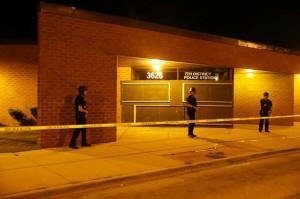|
Bar rises for Milwaukee police review
after latest shooting
 Send a link to a friend
Send a link to a friend
 [August 17, 2016]
By David Ingram [August 17, 2016]
By David Ingram
NEW YORK (Reuters) - Milwaukee, shaken by
two nights of violence after a shooting by police, is one of a few U.S.
cities to have volunteered for federal government review of its police
force and may now be held to higher standards for how it responds.
Beginning in December, the review included a public "listening session"
that, according to Milwaukee media, drew 700 people to a library
auditorium to air their frustrations to U.S. Department of Justice
officials.
Some community leaders said the weekend violence should result in a
tougher review and real change.
"I would hope that the cries of the unheard ... are now being heard
around the country out of Milwaukee," said Rev. Steve Jerbi, the lead
pastor at All Peoples Church in the Wisconsin city of about 595,000
people.
The Obama administration has promoted a $10 million nationwide voluntary
review program as a way to improve policing amid nationwide complaints
of racial profiling and targeting. Milwaukee has become the latest U.S.
city to experience discord after high-profile police killings of black
men over the past two years.

The review in Milwaukee will look at issues such as use of force, the
disciplinary system and diversity in hiring. The city was 45 percent
white in the 2010 Census, while the police department is 68 percent
white.
"Expectations of the report itself and of departmental compliance with
the report are going to be raised," said David Harris, a University of
Pittsburgh law professor who studies police behavior.
There is skepticism of how Milwaukee authorities will respond to federal
recommendations, after past responses fell short of demands.
Fred Royal, president of the NAACP's Milwaukee branch, noted that the
recommendations would not be legally binding, unlike those for cities
such as Cleveland, Ohio, where police use of deadly force and other
practices were being scrutinized under so-called consent decrees -
settlements without a final ruling by a judge.
"They don't have the teeth that a consent decree has," Royal said.
Businesses were torched and gunfire erupted in Milwaukee after the
shooting on Saturday of a black man, Sylville K. Smith, 23. Police said
he refused to drop a handgun when he was killed, and on Monday, the city
imposed a curfew.
"My experience with the Milwaukee Police Department has been that it is
a department in desperate need of fundamental change," said Flint
Taylor, a Chicago civil rights lawyer who has sued Milwaukee over police
tactics.
A spokesman for the Milwaukee Police Department said officials were not
available for an interview. Police Chief Edward Flynn has said
previously that his department has made progress and can withstand
scrutiny. A Justice Department spokeswoman said officials there declined
an interview request.
[to top of second column] |

Police stand guard after disturbances following the police shooting
of a man in Milwaukee, Wisconsin. REUTERS/Aaron P. Bernstein

The Justice Department is expected to release its findings within
about two months. Milwaukee could then receive outside assistance
and monitoring for up to two years.
Making the challenge tougher are deep problems of poverty and
segregation in Milwaukee, the 31st largest city in the United
States. Milwaukee was ranked as the most segregated city in America
by the Brookings Institution last year, and in the neighborhood
where the rioting took place more than 30 percent of people live in
poverty.
Residents have protested past police shootings, such as a 2014
killing in which an unarmed, mentally ill black man, Dontre
Hamilton, was shot 14 times. An officer was dismissed but no one was
charged.
In 2011, another black man, Derek Williams, died in the back of a
Milwaukee police car after he told officers he could not breathe and
needed help, according to a lawsuit his family filed. The city has
not responded to the lawsuit.
And in January this year, Milwaukee officials approved a $5 million
settlement with 74 black men who said they had been subjected to
illegal strip and cavity searches.
Las Vegas, which volunteered for the same federal program after a
series of shootings there in 2011, was handed a list of 75 findings
and recommendations by the Justice Department, and 18 months later
it had completed 90 percent of the recommendations, the department
said. Philadelphia and San Francisco are among other cities under
review.
(Reporting by David Ingram in New York; Additional reporting by
Brendan O'Brien in Milwaukee and Julia Harte in Washington; Editing
by Dina Kyriakidou Contini and Grant McCool)
[© 2016 Thomson Reuters. All rights
reserved.]
Copyright 2016 Reuters. All rights reserved. This material may not be published,
broadcast, rewritten or redistributed.

 |